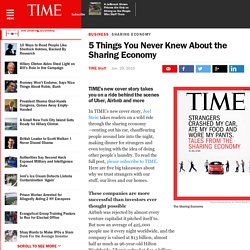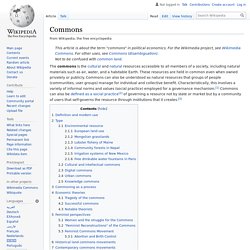

Use Co-opetition to Build New Lines of Revenue. Examples of high-profile failed business collaborations are everywhere.

From the WordPerfect-Novell acquisition that led to bankruptcy, to the misfires of the Target-Neiman holiday experiment, it’s clear that despite the plethora of management literature on how to launch a successful partnership, collaborations often go bust. It turns out, where there is money to be made, self-interest prevails, thus trumping cooperation in the process. Traditional collaborations fail because deep down, stakeholders assume their success must come at others’ expense, which is clearly a zero-sum game.
Painel II - A nova economia colaborativa: um modelo de pensar, ser e agir em rede. The Shut-In Economy — Matter. In 1998, Carnegie Mellon researchers warned that the internet could make us into hermits.

They released a study monitoring the social behavior of 169 people making their first forays online. The web-surfers started talking less with family and friends, and grew more isolated and depressed. “We were surprised to find that what is a social technology has such anti-social consequences,” said one of the researchers at the time. “And these are the same people who, when asked, describe the Internet as a positive thing.” We’re now deep into the bombastic buildout of the on-demand economy— with investment in the apps, platforms and services surging exponentially. Inventure. Microfinance banks generally give small loans to people with no credit scores, but that means "there’s no real data to answer the question, ‘What’s my basis for investing in this person?’

" says Shivani Siroya. She’s the CEO of InVenture, a certified B Corporation with an inventive solution: software that prospective borrowers willingly download onto their Android phones, which monitors and crunches 10,000 indicators of each person’s level of responsibility. For example, are the majority of someone’s calls longer than four minutes? 5 Things You Never Knew About the Sharing Economy. In TIME’s new cover story, Joel Stein takes readers on a wild ride through the sharing economy—renting out his car, chauffeuring people around late into the night, making dinner for strangers and even toying with the idea of doing other people’s laundry.

To read the full post, please subscribe to TIME. Here are five big takeaways about why we trust strangers with our stuff, our lives and our homes. These companies are more successful than investors ever thought possibleAirbnb was rejected by almost every venture capitalist it pitched itself to. But now an average of 425,000 people use it every night worldwide, and the company is valued at $13 billion, almost half as much as 96-year-old Hilton Worldwide. Uber is valued at $41.2 billion, one of the 150 biggest companies in the world–larger than Delta, FedEx or Viacom. Protótipo do Modelo 4D. Jeremy Rifkin: "The Zero Marginal Cost Society" Sharing Revolution. The recent rise of the commons and the sharing economy seems to suggest a growing recognition of the fact that our health, happiness, and security depend greatly on the planet and people around us.

On the Commons highlights the many ways, new and old, that people connect and collaborate to advance the common good and develop greater economic autonomy in our new e-book Sharing Revolution: The essential economics of the commons by Jessica Conrad. You can download the free e-book here. If Sharing Revolution adds value to your life and helps you see how the commons amplifies this new economic revolution, we hope you: Consider supporting our work with a financial contribution of any amount. Game Changers. What will the UK collaborative economy look like in 2025? Amid rising popularity and disruption, where is the UK collaborative economy headed?

Nesta has created six possible future scenarios for the UK collaborative economy. Looking ahead to 2025, each scenario highlights some of the key trends and assumptions that are currently driving forward this space, such as micro-entrepreneurship to environmental sustainability to local economic development. FUTURE PERFECT by Steven Johnson. Files/Capitalism_3.0_Peter_Barnes.pdf. Commons Abundance Network. Howard Rheingold: The new power of collaboration. Home. Commons. Shared resources The commons is the cultural and natural resources accessible to all members of a society, including natural materials such as air, water, and a habitable earth.

These resources are held in common, not owned privately. Commons can also be understood as natural resources that groups of people (communities, user groups) manage for individual and collective benefit. Charles Eisenstein. Sacred Economics traces the history of money from ancient gift economies to modern capitalism, revealing how the money system has contributed to alienation, competition, and scarcity, destroyed community, and necessitated endless growth.

Today, these trends have reached their extreme—but in the wake of their collapse, we may find great opportunity to transition to a more connected, ecological, and sustainable way of being. This book is about how the money system will have to change—and is already changing—to embody this transition. Prisoner's Dilemma In Real Life. Sharing Economy in 3 U.S. Cities,Trust in the Sharing Economy: In Conversation with the UK Government, Collaborative Pioneer Interview with Sweepsouth.
Percursos paralelos de investigação - Documentos de Google. Videos Economia Colaborativa. Cinese. Economia Compartilhada.